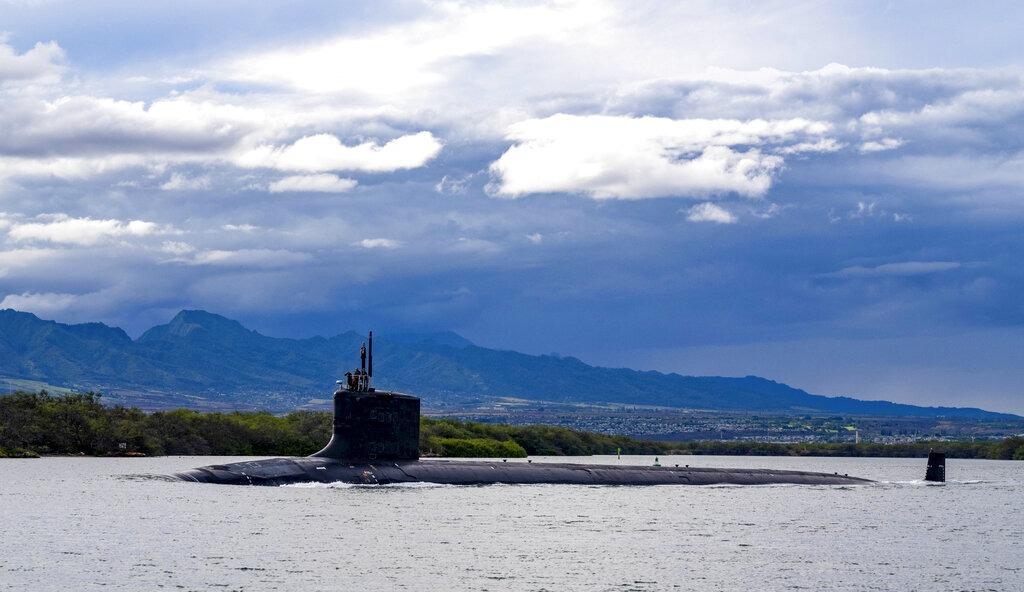 In this file photo provided by US Navy and dated Sept 1, 2021, the Virginia-class fast-attack submarine USS Missouri (SSN 780) departs Joint Base Pearl Harbor-Hickam for a scheduled deployment in the 7th Fleet area of responsibility. (PHOTO / US NAVY VIA AP)
In this file photo provided by US Navy and dated Sept 1, 2021, the Virginia-class fast-attack submarine USS Missouri (SSN 780) departs Joint Base Pearl Harbor-Hickam for a scheduled deployment in the 7th Fleet area of responsibility. (PHOTO / US NAVY VIA AP)
China reiterated its deep concern on Thursday about the risks of nuclear proliferation posed by AUKUS, a trilateral security pact of Australia, the United States and the United Kingdom, just days before a scheduled announcement by leaders of the three countries.
Li Song, China's permanent representative to the International Atomic Energy Agency, said the AUKUS nuclear submarine cooperation constitutes serious nuclear proliferation risks, brings a negative impact to the international nuclear nonproliferation regime, provokes an arms race and impairs peace and stability in the Asia-Pacific region.
"It has been widely questioned and opposed by the countries in the region and the international community," Li told the IAEA board of governors meeting in Vienna.
At Thursday's meeting, Russia and a number of other countries voiced their support for China's stance.
US President Joe Biden, Australian Prime Minister Anthony Albanese and UK Prime Minister Rishi Sunak are expected to meet in San Diego on Monday to announce a major plan regarding AUKUS.
Li Song, China's permanent representative to the International Atomic Energy Agency, said the essence of the cooperation is the transfer of tons of highly enriched weapons-grade uranium by the US and the UK, which are nuclear-weapon states, out of geopolitical and strategic security considerations
Under the plan, Australia is expected to buy up to five US Virginia class nuclear-powered submarines in the 2030s as part of the trilateral military pact.
ALSO READ: China calls for global discussion on AUKUS proliferation risks
"The AUKUS submarine cooperation is now at a critical juncture," Li said.
He added that the essence of the cooperation is the transfer of tons of highly enriched weapons-grade uranium by the US and the UK, which are nuclear-weapon states, out of geopolitical and strategic security considerations. They are also depository states of the Treaty on the Non-Proliferation of Nuclear Weapons, or NPT, to Australia, their military ally and a non-nuclear-weapon state.
"Such an act is a textbook case of nuclear proliferation, runs against the object and purpose of the NPT and poses grave challenges to the existing IAEA safeguards system and the NPT regime, and has numerous negative implications for the years to come," Li said.
In Beijing, Foreign Ministry spokeswoman Mao Ning echoed the position stated by Li.
"We urge the US, the UK and Australia to abandon their Cold War mentality and zero-sum game, fulfill their international obligations in good faith and act in the interest of regional peace and stability," Mao told a daily briefing on Thursday.
At Thursday's IAEA meeting, Li rebuffed AUKUS' claim that the impact of its nuclear submarine cooperation on regional security and its multiple effects relating to military capabilities are beyond the IAEA mandate, and therefore should not be discussed within the agency.
ALSO READ: AUKUS: Cloud hangs over Australia nuclear subs ambition
"This is groundless. The AUKUS nuclear submarine cooperation is obviously not a cooperation of peaceful uses in a setting that 'everything is fine and harms no one'," Li said.
At Thursday's IAEA meeting, Li rebuffed AUKUS' claim that the impact of its nuclear submarine cooperation on regional security and its multiple effects relating to military capabilities are beyond the IAEA mandate, and therefore should not be discussed within the agency.
"It has to be reviewed from the perspective of its negative impact on the international and regional security and a larger background of the effectiveness of the NPT regime."
Li said these thoughts will linger in the minds of NPT states and the IAEA member states.
"It is also a reality that the IAEA Secretariat cannot ignore," he said.
Li noted that in the context of the IAEA's safeguards mandates, the transfer of large amounts of highly enriched weapons-grade uranium in the AUKUS deal is "unprecedented".
"There are ample reasons to involve all the member states in seeking an appropriate solution through intergovernmental discussions," Li said.
READ MORE: China against IAEA budget use for AUKUS safeguards activities
James Acton, co-director of the nuclear policy program at the Carnegie Endowment for International Peace in Washington, criticized the AUKUS deal right after its formation in 2021.
"In my assessment, the nonproliferation implications of the AUKUS submarine deal are both negative and serious," Acton said.


